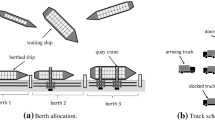Abstract
Consider a manufacturing process in which a group of machines (or people) perform a single operation on a number of different parts. The processing time depends on both the part and the machine. In addition, each machine requires significant setup time between processing different part types. The problem consists of obtaining a feasible allocation of parts to machines such that the makespan (i.e. greatest machine workload) is minimized. We present two equivalent 0–1 models. The first model arises by considering the assignment of individual parts to machines. It is amenable to Lagrangian decomposition techniques. The second model is more hierarchical in nature; it considers the two options of assigning an entire part type to a single machine, or of splitting the type across machines. The second model is more amenable than the first to branch-and-bound techniques. We report about our computational experience for finding lower bounds of the optimal solution by appending violated cuts and, ultimately, obtaining the optimal solution of real-life problems.
Access this article
We’re sorry, something doesn't seem to be working properly.
Please try refreshing the page. If that doesn't work, please contact support so we can address the problem.
Similar content being viewed by others
References
E.M.L. Beale and J.A. Tomlin, Special facilities in a general mathematical programming system for nonconvex problems using ordered sets of variables, in:Operations Research 69, ed. J. Lawrence (Tavistock Publ., London, 1970) pp. 447–454.
H. Crowder, E.L. Johnson and M. Padberg, Solving large-scale zero–one linear programming problems, Oper. Res. 31(1983)803–834.
B.L. Dietrich, A two phase heuristic for scheduling on parallel unrelated machines with setups, in:Flexible Manufacturing Systems, ed. K.E. Stecke and R. Suri (Elsevier Science, Amsterdam, 1989) pp. 187–192.
B.L. Dietrich and L.F. Escudero, Coefficient reduction for knapsack constraints in 0–1 programs with variable upper bounds, Oper. Res. Lett. 9(1990)9–14.
B.L. Dietrich and L.F. Escudero, On strengthening the formulation of the workload allocation problem for parallel unrelated machines with setups, PUMS, RC 14832, IBM Research, T.J. Watson Research Center, Yorktown Heights, NY (1989).
B.L. Dietrich and L.F. Escudero, On identifying maximal cliques and extensions of minimal covers implied by 0–1 knapsack constraints, RC 15960, IBM Research, T.J. Watson Research Center, Yorktown Heights, NY (1990).
L.F. Escudero, S2 sets. An extension of the Beale-Tomlin special ordered sets, Math. Progr. 42(1988)113–123.
M. Guignard and K. Spielberg, Logical reduction methods in zero–one programming (minimal preferred variables), Oper. Res. 29(1981)49–74.
M. Guignard, E. Chajakis and H. Lee, Minimizing makespan on parallel unrelated machines with setups. New results with Lagrangian decomposition, ORSA/TIMS Meeting, Anaheim, CA (1991).
IBM, MPSX/370, Mathematical Programming System Extended/370, version 2, Reference Manual SH19-6553 (1989).
E.L. Johnson, M.M. Kostreva and U. Suhl, Solving 0–1 integer programming problems arising from large-scale planning models, Oper. Res. 35(1985)803–819.
S. Martello and P. Toth,Knapsack Problems, Algorithms and Computer Implementations (Wiley, New York, 1990) pp. 189–220.
Author information
Authors and Affiliations
Rights and permissions
About this article
Cite this article
Dietrich, B.L., Escudero, L.F. On modelling the maximum workload allocation for parallel unrelated machines with setups. Ann Oper Res 43, 357–377 (1993). https://doi.org/10.1007/BF02024935
Issue Date:
DOI: https://doi.org/10.1007/BF02024935




